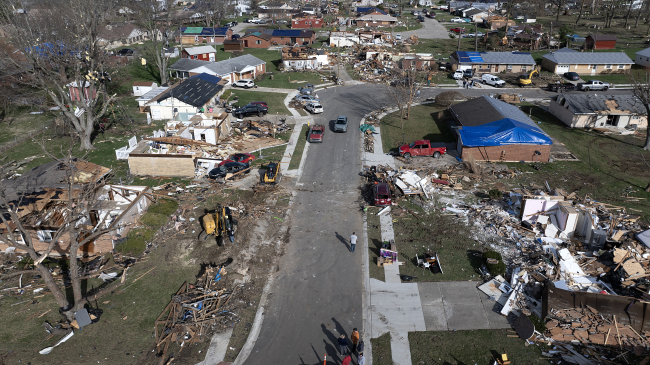February was wetter and warmer than average
Winter? For some regions of the country it was as if it never happened at all.

February 11, 2020 -- An aerial photo of a levee failure that flooded the Springridge Place Subdivision in Yazoo County, Mississippi, following heavy rainfall. Four homes and a church were threatened. (Image credit: MS Emergency Management Agency via Facebook)
In fact, the period from December through February was much warmer than normal across the contiguous United States, while precipitation remained above-average, according to NOAA’s National Centers for Environmental Information.
February continued the balmy trend, with unusually warm and wet conditions across the Lower 48 states last month.
Not so for Alaska: The state shivered under its coldest February in more than 20 years.
Here are more highlights from NOAA’s latest monthly U.S. climate report:
Climate by the numbers
February 2020
The average February temperature across the contiguous U.S. was 36.2 degrees F (2.4 degrees above the 20th-century average), which ranked in the warmest third of the 126-year record.
Last month’s average precipitation was 2.40 inches (0.27 of an inch above average), ranking in the wettest third of the historical record.
Much-above-average temperatures were felt across parts of the Mid-Atlantic and Northeast, as well as portions of California. No state tallied below-average temperatures for the month.
Very wet conditions and flooding were seen across much of the Southeast during February. Georgia ranked second wettest, while Alabama and North Carolina ranked third wettest.
Latest 12-month period and meteorological winter
It was a very warm and relatively wet meteorological winter (December through February) across the contiguous U.S. The average winter temperature was 36.0 degrees F (3.8 degrees above average), which made it the sixth warmest winter on record.
Total winter precipitation was 7.71 inches — 0.92 of an inch above average — ranking in the wettest third of the historical record. Winter was also part of a very wet stretch of months since last year, with a 12-month period (March 2019 through February 2020) precipitation total of 34.12 inches — 4.16 inches above average. It was the sixth wettest such period on record.
More notable climate events
-
Alaska on ice: It was the coldest February since 1984 in Utqiaġvik (Barrow), Alaska, and for the first time in 21 years, Fairbanks remained below freezing during all of meteorological winter.
-
The South got soaked: Alabama and Georgia had their wettest winter on record, while South Carolina saw its second wettest. In Jackson, Mississippi, wet weather pushed the Pearl River to its highest level since 1983, which caused significant and destructive flooding.
-
California eyes its water supply: After a very dry January, California had a record-dry February with only 0.20 of an inch of precipitation, beating the previous record of 0.31 inch in 1964. The arid winter increased concerns for sufficient water to get through the summer, as well as to fight wildfires that commonly occur in the fall.
More > Access NOAA’s latest climate report and download the images.
Media contact
John Bateman, (301) 713-9604



